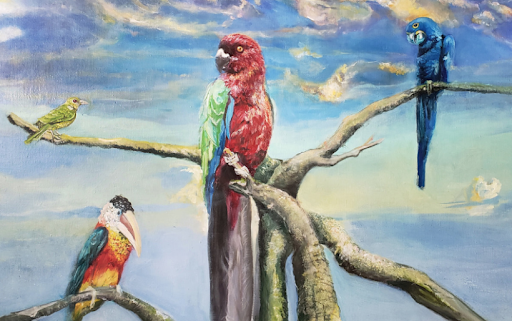Album Review: Alex G Tries Hope for a Change on ‘God Save the Animals’
Alex G has built a career – and an avid fanbase – off of his subversive lyrics and often wavering vocals. On his latest record, he steps out of the muddled waters of Bandcamp and enters the studio for the first time. Maybe it’s the newfound access to high-tech equipment or maybe it’s the presence of a spiritual force, but, for one of the first times in his career, Alex G sounds optimistic.
Written by Grace Robertson
Photo courtesy of Tonje Thilesen
Alex Giannascoli — more widely known by the moniker Alex G — has been producing music since he was a 12-year-old posting behind a cartoon avatar on MySpace. Now, at 29, he’s built a collection of surprisingly vulnerable, halting songs hidden behind well-constructed layers of vocal modulation and distortion. The singer-songwriter has always had a knack for toeing the line between indiscernible chaos and ear-wormy melodies, but the studio-produced polish of God Save the Animals makes that balance nearly epiphanic.
Take the opener “After All,” a delicately finger-plucked admission of loss and hope tuned to Alex G’s artificially processed voice. While past work sometimes leans too aggressively into an array of distorted guitar lines, “After All” is remarkably well-balanced, with a clean piano melody and subtle hollow drumming that grounds the track. Unlike previous work, the track feels nearly sanguine – “Did the world feel so unkind? / Well the years have passed and I can say / That a love will come in time.”
This is a strong contrast from the tone of Alex’s previous projects — he’s written from the perspective of an abandoned child, a friend reeling from the aftereffects of an overdose, a witness to a depressive episode — but he has always had a knack for writing characters that are lovable, often in a mildly pathetic way. Despite the poignant lyrics, most of these tracks are backed by a cheery major-chord progression or a catchy melody that distances the listener from the bluntness of the content.
This isn’t to say there’s none of that signature cognitive dissonance on God Save the Animals. “Blessing,” which opens with a synthesized droning that sounds like a football walkup song from hell, suddenly switches its tone to a more foreboding, dynamic guitar line as Alex whispers, “Every day (every day) / Is a blessing (is a blessing) / I will rise (I will rise) / From the flood (from the flood).”
Alex consistently falls back on religiosity, or at least half-hearted references to a divine force, throughout the record. His penchant for irony makes it difficult to determine exactly how seriously to take intermittent cries to a higher force of some kind (on the slightly creaky “S.D.O.S.,” he claims, “God is my designer / Jesus is my lawyer”), but to analyze too closely the potential spirituality of the artist would be to miss the point. Throughout the album, he never strays too far into tangible religious territory. The concept of God is more of a soundboard for Alex to bounce questions and electronica off of, without expecting a clear answer in return. Take the peppy “Early Morning Waiting,” which finds the musician with “half of love and half of death / Burning questions in your bed.” The song ends with no clear resolution; just a keyboard line that lends the song a video-game chirpiness despite the existentialism of the lyrics.
Image courtesy of Alex Giannascoli
Alex G’s transience is a part of his artistry: in 2017, he even changed his name from Alex G to (Sandy) Alex G, switching back in 2020 without an explanation, and barely an acknowledgment. On God Save the Animals, he’s not afraid to focus more on experimentation than consistency. “Headroom Piano” is sharply rhythmic, full of staticky vocals and piercing guitar riffs. Even though the weight of the instrumentals sometimes overwhelms the track, piecing together the layers of distortion is an exercise worth undertaking.
“Runner” has a bright, alt-rock feel that’s much more digestible. Despite the album’s name, Alex consistently gravitates back to human connection — “I like people who I can open up to / Who don’t judge me for what I say, but judge me for what I do” — but ends the track in a guttural yell after a conflicting admission of his own guilt (“I have done a couple bad things”). The guilt doesn’t last long, however. For one of the first times in his career, the artist turns toward the future on “Miracles,” a folksy track full of gentle finger-plucks and a fiddle that beautifully compliments his voice as he sings, “You say that one day we should have a baby / Well, God help me, I love you, I agree, yeah.” Potential child-rearing is the kind of hesitant optimism that marks a major shift in Alex’s work — instead of vividly reliving past mistakes, he turns toward the future, and the responsibility that comes with it.
The standout of the album, “Cross the Sea,” comes about halfway through, and it has all of the elements of a perfect Alex G song: a modulated voice, an enthusiastic chorus backed by horns, and an ending consisting of a series of eerie, electronic breakdowns. It’s a surprising twist from the beginning of the album, where he disavowed the reliability of consistent relationships (“People come and people go away / Yeah but God with me he stayed”). On “Cross the Sea,” he does more than just acknowledge love – he encourages it, trumpeting, “I cross the field for my baby / You can believe in me, yeah.”
And we can. It’s unclear if Alex G ever found a god to save the animals (maybe because he didn’t spend enough time searching, either for God or for animals), but he did find something he could believe in: love. He ends the album on a cathartic cry to forgive, to choose to embrace today. And on a record that finds solace in places he used to run from, it’s clear he ultimately did.


